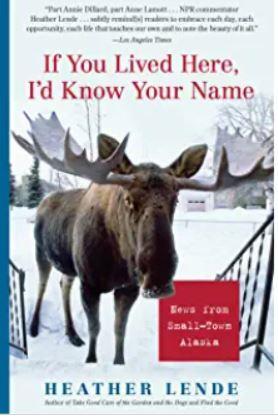
If You Lived Here, I'd Know Your Name: News from Small-Town Alaska
By Heather Lende. Algonquin Books of Chapel Hill, 2005, 282 pp.
Haines, Alaska is the focus of Heather Lende's book, and though the town may be small, it abounds in contradictions.
The area is so beautiful that John Muir, who visited in 1879, warned young people to stay away from the region because after seeing it, other places would forever disappoint them. But,says Lende, it is also "isolated, cloudy, and cold."
The town is safe, a place where you needn't lock your door. But life in Haines is also risky—there's no hospital, the small plane you need to take might crash, or you might fall through the not-quite-frozen lake while ice skating and contemplating the region's beauty.
And while this town of around 2400 is clearly a close-knit community, the residents are divided on pretty much everything, which leads to terrible "fights whenever there's a local election or public hearing."
Clearly, this is a place likely to inspire different responses. Indeed, one tour guide reported that in a single day she had "a group who said they couldn't live in Haines for forty-eight minutes or they'd go nuts and another…where everyone wanted to know how to buy land here."
Heather Lende loves the place. Originally from the East Coast, she and her husband, Chip, arrived in Haines in 1984, after living for a year in Anchorage, and they settled in, raising five kids. At the time this book was published, in 2005, Chip owned a lumberyard and hardware store, and Heather was writing for the Chilkat Valley News, covering social events—"Duly Noted"—as well as obituaries.
These two beats, life and death in Haines, provide Lende with ample material for the pieces in the book and frame her own personal stories. The 22 pieces are nicely varied, ranging in subject from the sinking of a fishing boat and loss of a young man to the town's handling of an episode of intolerance at the high school to a blueberry-picking excursion that turns into a lively affair involving some sexy blue lingerie. Throughout, Lende reflects on her religion, on social and moral issues, and on her role as a mother, wife, and homemaker.
Lende clearly enjoys the quirky characters who live in Haines, and I found her generous profiles the best part of the book. I especially enjoyed her portrait of Bill O'Neal. If you were typing people, you might expect this church-going, retired air force sergeant of 76 to be a right-wing conservative, she says. But in fact he was a liberal Democrat who suggested that the street and place name signs in Haines should revert to Tlingit and that Haines itself should go back to its original name, Deishu, or "End of the Trail."
Lende is upbeat but not Pollyannaish, and her engaging stories vividly convey a sense of daily and mortal life in this particular small American town.